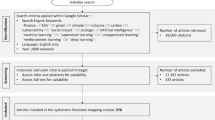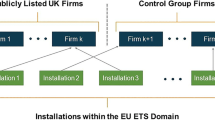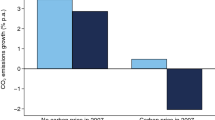Abstract
We discuss selected methodological problems of previous Double Auction (DA) experiments and test the hypothesis that a Multiple Unit Double Auction (MUDA) is able to prevent market power in an emissions trading market. Additionally, we analyze how the information subjects receive about the market structure and different levels of subjects’ experience influence the behavior. Based on a larger number of independent observations than analyzed in previous studies, the experiment generates two main results. First, emissions trading markets ruled by a MUDA realize a high degree of efficiency even under market power conditions. However, a MUDA is, in general, not able to restrict market power. We observe persistent price discrimination in two market power environments, i.e., the distribution of profits is strongly shifted in favor of the strong market side without greatly harming efficiency. This result is independent of the information to subjects about the market structure. Second, when subjects are experienced, the efficiency is higher and the ability of the strong market side to exercise market power declines strongly. However, the variability of behavior is large and the strong market side is still able to realize supracompetitive profits in some groups.
Similar content being viewed by others
References
Ball SB and Cech PA (1996). Subject pool choice and treatment effects in Economic Laboratory Research. In: Isaac, MR (eds) Research in experimental economics, JAI Press, Greenwich
Bohm P (2000). International greenhouse gas emissions trading—with special reference to the Kyoto protocol. In: Carraro, C (eds) Efficiency and equity of climate change policy, pp 93–119. Kluwer Academic Publishers, Dordrecht
Böhringer C and Löschel A (2003). Market power and hot air in international emissions trading: the impacts of U.S. withdrawal from Kyoto-protocol. Appl Econ 35: 651–664
Brown-Kruse J, Elliott SR, Godby RW (1995) Strategic manipulation of pollution permit markets: an experimental approach. Draft paper
Carlén B (1999) Large-country effects in international emissions trading: a laboratory test, research papers in economics, vol 15. Department of Economics, University of Stockholm
Cason TN, Friedman D (1993) An empirical analysis of price formation in Double Auction markets. In: Friedman D, Rust J (eds) The Double Auction market. Institutions, theories and evidence. Santa Fe Institute, pp 253–283
Cason TN, Gangadharan L and Duke C (2003). Market power in tradable emission markets: a laboratory testbed for emission trading in Port Phillip Bay, Victoria. Ecol Econ 46: 469–491
Dales J (1968). Pollution, property and prices. University of Toronto Press, Toronto
Davis DD and Holt CA (1993). Experimental economics. Princeton University Press, Princeton
Easley D, Ledyard J (1993) Theories of price formation and exchange in Double Auctions. In: Friedman D, Rust J (eds) The Double Auction market. Institutions, theories and evidence. Santa Fe Institute, pp 63–97
Friedman D (1984). On the efficiency of Double Auction markets. Am Econ Rev 74: 60–72
Friedman D (1991). A simple testable model of Double Auction markets. J Econ Behav Organ 15: 47–70
Godby RW (1999) Market power in emission permit Double Auctions. In: Isaac RM, Holt CA (eds) Research in experimental economics, vol 7, pp 121–162
Godby RW, Mestelman S, Muller RA and Welland JD (1997). Emissions trading with shares and coupons when control over discharges is uncertain. J Environ Econ Manage 32: 359–381
Holt CA (1995). Industrial organization: a survey of laboratory research. In: Kagel, JH and Roth, AE (eds) The handbook of experimental economics, pp 349–443. Princeton University Press, Princeton
Misiolek WS and Elder HW (1989). Exclusionary manipulation of markets for pollution rights. J Environ Econ Manage 16: 156–166
Montgomery D (1972). Market in licenses and efficient pollution control programs. J Econ Theory 5: 395–418
Muller RA, Mestelman S, Spraggon J and Godby RW (2002). Can Double Auctions control monopoly and monopsony power in emissions trading markets?. J Environ Econ Manage 44: 70–92
Smith VL (1976). Experimental economics: induced value theory. Am Econ Rev 66: 274–279
Smith VL (1981). An empirical study of decentralized institutions of monopoly restraint. In: Horwich, G and Quirk, JP (eds) Essays in contemporary fields of economics in honor of Emanuel T. Weiler (1914–1979), pp 83–106. Purdue University Press, West Lafayette
Smith VL and Williams AW (1989). The boundaries of competitive price theory: convergence, expectations and transaction costs. In: Green, L and Kagel, JH (eds) Advances in behavioral economics, pp 31–53. Ablex Publishing Corporation, Norwood
StataCorp (2003) Stata statistical software: Release 8.0, College Station, TX, Stata Corporation
Sturm B, Market power in a multiple unit Double Auction: experimental evidence and its relevance for emissions trading. In: Antes R, Hansjürgens B, Letmathe P (eds) Emissions trading and business, vol 2. Springer, Berlin (forthcoming)
Tirole J (2003). The theory of industrial organization, 14th edn. MIT Press, Cambridge
Author information
Authors and Affiliations
Corresponding author
Rights and permissions
About this article
Cite this article
Sturm, B. Market Power in Emissions Trading Markets Ruled by a Multiple Unit Double Auction: Further Experimental Evidence. Environ Resource Econ 40, 467–487 (2008). https://doi.org/10.1007/s10640-007-9165-9
Received:
Accepted:
Published:
Issue Date:
DOI: https://doi.org/10.1007/s10640-007-9165-9




